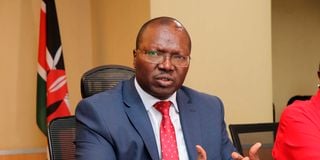Strong leadership is pivotal to the growth, success of a cooperative

Cooperatives Cabinet Secretary Simon Chelugui.
In the past week, the Kenya Society of Professional Cooperators held its annual general meeting. On the agenda was election of leaders. Like the professional body, election of leaders for the cooperatives is a regular agenda item.
Indisputably, all cooperatives need good leaders. They provide direction and vision, motivate and inspire. Leaders must lead their cooperatives into unchartered waters; only then can a cooperative discover new islands. It is foolhardy to expect a cooperative to perform beyond the capacity of its leadership.
Leaders shape the destiny of institutions. Thus, the quality of leaders makes the difference between failure and success of a cooperative. Most failures, indeed, stem from ineffective leadership.
For some, leadership is the ability to influence people to strive willingly for mutual objectives; or the ability of a person to make people work in harmony and confidence towards the achievement of the individual, organisation and community goals.
In cooperative societies, governance is subject to direction from a general meeting and by-laws. Effective leaders motivate members and encourage member involvement while poor ones cause lethargy and disinterest among them. A cooperative with effective leadership will be more productive, efficient and, ultimately, successful.
Effective leaders also motivate employees, which enhances their productivity. They incorporate them, causing them to feel valued, which makes them more engaged and motivated. Thus, good leaders must take time to understand their employees and discover what would make them more productive.
The need for strong leaders is universal. A recent survey by the Canadian Centre for the Study of Cooperatives identified the major issues for Canadian cooperatives last year. For the second year in a row, the third-most important challenge the sector faced was the desire to develop strong leaders.
Respondents said their cooperatives did not have a strong succession plan for replacing retiring leaders with younger persons. Consequently, cooperatives are increasingly recruiting persons from outside the sector to take on leadership roles, which shifts a significant risk towards the movement.
Brought from outside
The report says when leadership is brought from outside, there is a danger that it will not buy into the cooperative model, cooperative values and principles. Also, their language and viewpoints are likely to be different from homegrown cooperative leaders; it makes the difference between success and failure.
The experience of Githunguri Dairy Farmers Cooperative Society illustrates why strong leadership is essential. From zero turnover in 1961 to a more than Sh6 billion enterprise in 2023, it has taken leaders of focused vision to move that giant. Leaders who dared to think of ‘out-of-the-box’ solutions. Working with limited resources, they expanded their options gradually, increased the membership and were more deliberate in their engagements.
In 2004, it established its first milk processing plant, which produces Fresha whole milk, their flagship product. To create loyalty from members, it established a sacco to offer affordable loans to members. According to the dairy cooperative’s leaders, their success stems from non-interference by politicians and absence of strife in the boardroom.
The leaders have also invested in Cooperative Principle #5, by providing education and training for their members, elected representatives, managers and employees so they can contribute effectively to the cooperative’s development. They organise monthly training sessions with farmers to train them on handling milk and farm management in a bid for a competitive edge for their products.
Clearly, good leadership plays a catalytic role which spurs the cooperative to grow and bring greater benefit to members. Nonetheless, cooperatives often get sucked into problems resulting from poor leadership—or lack of it. Without strong leadership, achieving success at individual and organisational levels would be challenging.
- Prof Nyamongo, anthropologist and Fulbright scholar, is a deputy vice-chancellor at The Cooperative University of Kenya. [email protected]. @Prof_IKNyamongo




